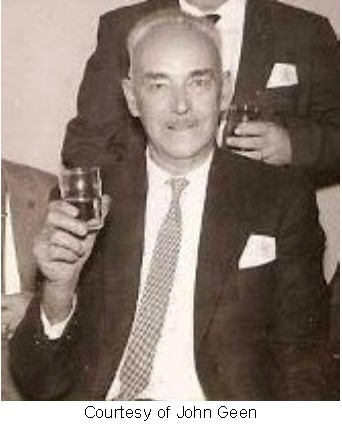|
Feb 14, 1894
|
Born in Lindsay, Ontario to John and Daisy (nee
Senechal) Michaud
|
|
Nov 25, 1912
|
Married to Emily Vera Eves in Belleville, Ontario
|
|
Nov 7, 1914
|
Attested into the 21st Battalion in Kingston, Ontario
Ø Number 59657 (temporary number 834)
Ø Next of kin given as Emily Michaud, wife, 15 North Front St.,
Belleville, Ontario
Ø Previous occupation given as Insurance Agent
o Later noted as Locomotive Fireman
Ø Previous military experience given as 25th Victoria
Rifle Regiment in Lindsay, Ontario
Ø Religion given as Wesleyan
Ø Posted to “H”” Company
o This was later reorganized into “D” Company
Promoted to the rank of Corporal
The 21st Battalion trained in the Kingston, Ontario
area through the winter of 1914-15.
|
|
Jan 12, 1915
|
Reverted to the rank of Private
|
|
Apr 17, 1915
|
Forfeited 1 day’s pay for an unrecorded offence
|
|
May 6, 1915
|
Embarked the RMS Metagama in Montreal, Quebec
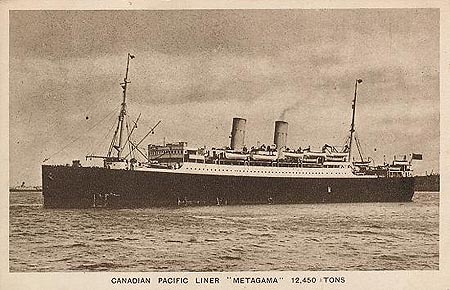
|
|
May 15, 1915
|
Disembarked in Devonport, England and the
battalion proceeded to the West Sandling Camp, near Hythe, Kent to continue
training
|
|
Sep 14, 1915
|
Embarked the St. Seiriol in Folkestone
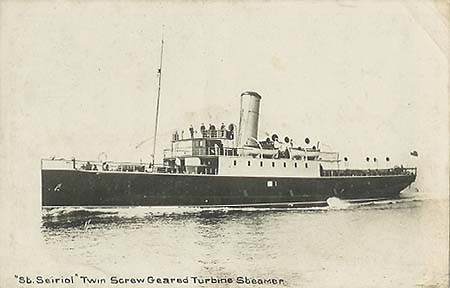
|
|
Sep 15, 1915
|
Disembarked in Boulogne, France and the battalion
proceeded to St. Omer
|
|
Nov 14, 1915
|
Admitted to the No. 6 Field Ambulance and placed
in the 2nd Division Rest Station at Loker, Belgium with a
diagnosis that reads Muscular Rheumatism
|
|
Nov 22, 1915
|
Transferred to the North Midlands Rest Station at
Mont des Cats, France and Arthritis was added to the diagnosis
|
|
Dec 17, 1915
|
Discharged to duty from the rest station
|
|
A first hand
account of his fears in his first real combat

|
|
Feb 7, 1916
|
Transferred to the 3rd Canadian
Tunnelling Company and his rank was changed to read Sapper, the Engineering
equivalent to Private
|
|
Sep 30, 1916
|
Granted 10 days leave
|
|
Jan 9, 1917
|
Admitted to the 75th Field Ambulance
with a diagnosis that reads Scabies
|
|
Jan 10, 1917
|
Transferred to the No. 9 Corps Scabies Hospital
|
|
Jan 16, 1917
|
Transferred to the 50th North Casualty
Clearing Station
|
|
Feb 12, 1917
|
Transferred via the No. 10 Ambulance Train and
admitted to the No. 14 Canadian General Hospital in Wimereux, France with
septic sores
|
|
Feb 14, 1917
|
Transferred to the No. 25 General Hospital in
Hardelot, France and the diagnosis was changed to read ICT (Inter Connective
Tissue) infection in the buttocks
|
|
Feb 25, 1917
|
Transferred to the No. 7 CCD (Canadian
Convalescent Depot) in Boulogne, France
|
|
Mar 1, 1917
|
Discharged from hospital and reported to the No.
3 Large Rest Camp, north of Boulogne
|
|
Mar 9, 1917
|
After leaving the rest camp, he joined the CBD
(Canadian Base Depot) in the Rouelles Camp, Havre, France
|
|
Mar 19, 1917
|
After leaving the base depot, Sapper Michaud
rejoined the tunnelling company
|
|
Jun 1, 1917
|
Awarded the Good Conduct Badge
|
|
Jun 30, 1917
|
Admitted to the No. 11 Casualty Clearing Station
with a scalp wound
|
|
Jul 2, 1917
|
Discharged to duty from the casualty clearing
station
|
|
Oct 15, 1917
|
His location came under a gas attack while
working near Mount Sorrel in Belgium, and Sapper Michaud suffered exposure
it. There is no record in his file
that he received hospital treatment at that time
|
|
Oct 19, 1917
|
Evacuated to a casualty clearing station
suffering from the effects of gas exposure
|
|
Oct 20, 1917
|
Transferred to the No. 22 General Hospital in
Camiers, France
|
|
Oct 22, 1917
|
Invalided to England aboard the Hospital Ship
Ville de Liege
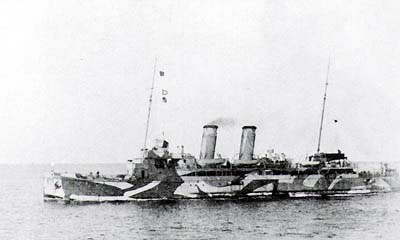
On arrival in England, he was admitted to the
Norfolk War Hospital in Norwich
Transferred to the CERD (Canadian Engineers
Regimental Depot) for pay purposes while in hospital
|
|
Nov 3, 1917
|
Transferred to the Canadian Convalescent Hospital
in Woodcote Park
|
|
Dec 6, 1917
|
Transferred to the King’s Red Cross Convalescent
Hospital in Bearwood Park and VDH (Valvular Disease of the Heart) was added
to the diagnosis. This was later
called DAH (Disordered Activity of the Heart)
On admission he complained of Dyspnoea (shortness
of breath), Heart Palpitations, Vertigo, Chest Pain and Fatigue
|
|
Dec 19, 1917
|
Transferred to the Clarence House Hospital
|
|
Jan 30, 1918
|
Discharged from hospital and granted sick leave
until February 9, 1918
|
|
Feb 9, 1918
|
Reported to the CETD (Canadian Engineer Training
Depot) on completion of his sick leave
|
|
Mar 27, 1918
|
Attached to the CDD (Canadian Discharge Depot) in
Buxton pending return to Canada
|
|
Apr 24, 1918
|
Embarked the SS Aquitania in Liverpool
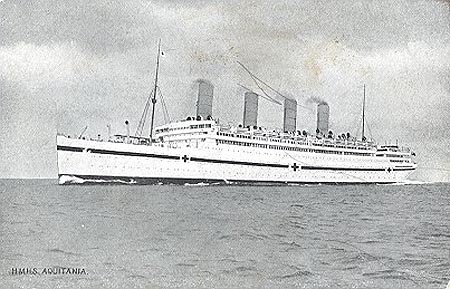
|
|
Apr 29, 1918
|
Disembarked in Halifax, Nova Scotia
|
|
May 28, 1918
|
Transferred to the Military District No. 3 AMC
(Army Medical Corps) in Kingston
Medical Board in Kingston notes
Ø Complains of dizzy spells and
shortness of breath
Ø Says he cannot walk very fast
Ø Has swelling of feet and legs
Ø Heart is slightly enlarged
Ø Has a slight heart murmur
Ø His incapacity is rated at 50%
and probably permanent
Ø Board recommends he be
discharged from military service
|
|
Jun 27, 1918
|
Discharged from the CEF in Kingston, Ontario
Ø Rank on discharge Private
Ø Entitled to War Service Badge
Class “A”
Ø Proposed residence on
discharge 12 Harriett St., Belleville, Ontario
Following the end of the war, the 1914-15 Star,
British War Medal and Victory Medals were sent to him at 9 Ridley St.,
Belleville, Ontario
|
|
Feb 4, 1921
|
William’s wife Emily Vera Michaud died of Acute
Nephritis while a patient in the Belleville Ontario Hospital and was interred
in the Belleville Cemetery
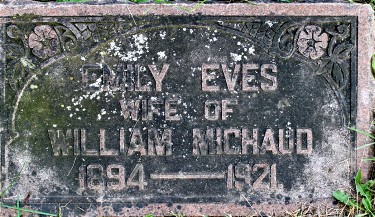
|
|
Jan 24, 1922
|
Married to Frances Adella Gleason in Belleville, Ontario. On the marriage licence, he is shown as a
widower.
From 1962 to 1973, Bill Michaud acted as the
editor of the Communiqué, the battalion’s post war
newsletter
|
|
Aug 10, 1975
|
William J. Michaud died in Shannonville, Ontario
and was buried in the Belleville Cemetery
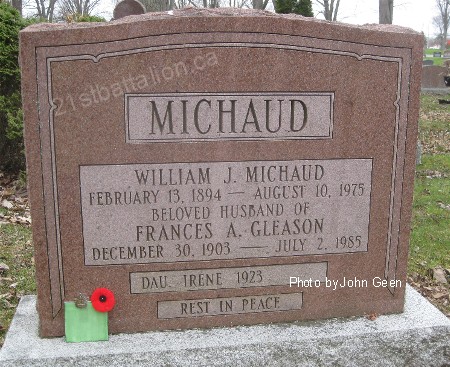
|
|
